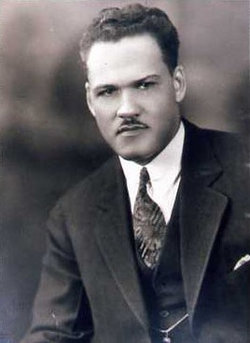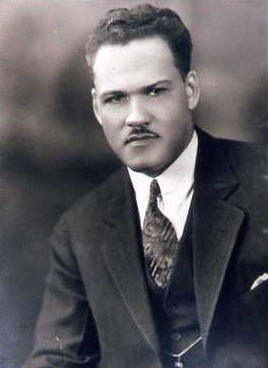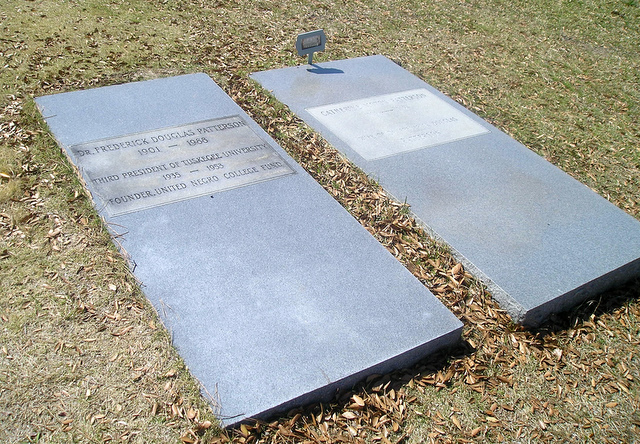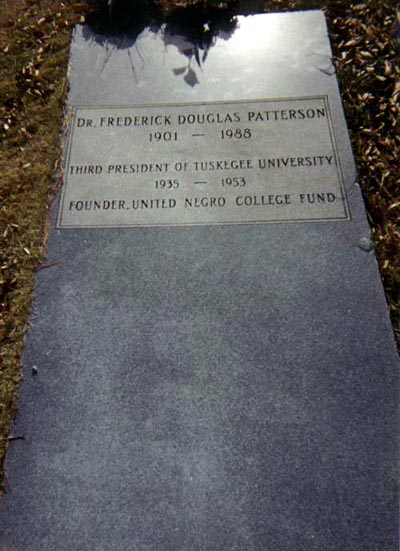Dr. Patterson joined Tuskegee Normal and Industrial Institute in Alabama in 1928. He would become president of Tuskegee in 1935-1953. One of his greatest accomplishments while there was to lead the creation of Tuskegee's School of Veterinary Medicine in 1944. It was the first school of veterinary medicine at a black institution of higher learning. Nearly 75% of black veterinarians in the U.S. graduate from Tuskegee's School of Veterinary Medicine. It was also under Dr. Patterson's tenure as president that the Black Army Air Corps was launched at Tuskegee. It would be the forerunner of the Tuskegee Airmen. Patterson had learned to fly while at Tuskegee and wanted to provide the opportunity for other young African American students to do so as well. At the time the U.S. Military was segregated so this was no small undertaking. Dr. Patterson obtained a federal grant to launch a training site for the Black Army Air Corps which would then produce the Tuskegee Airmen of World War II fame.
Another crowning achievement of Dr. Patterson in 1943 was his founding of the United Negro College Fund (UNCF). Still in existence today, UNCF is a national organization that raises funds for small, private, historically black colleges and universities (HBCU). The first national campaign was launched in 1944. In 1972, UNCF launched its signature mottto, "A mind is a terrible thing to waste." UNCF would become the greatest independent fundraiser for black educational institutions across the United States and through its efforts provides vital funding to support scholarships, salaries, library resources, laboratories, and instructor resources. UNCF has raised over $3.6 billion since its inception. (Yes that's right billion!). UNCF currently has 37 member colleges and universities. Many are unaware that in addition to its 37 member black colleges and universities; UNCF also provides support to students who attend other institutions of higher learning as well. In total UNCF has supported students at over 1,100 colleges and universities.
Dr. Patterson received numerous awards during his life time including the Presidential Medal of Freedom in 1987 and the NAACP Springarn Medal in 1988. His work continues to be carried out through the Frederick D. Patterson Institute (FDRI). The institute was started as a research organization to inform policy makers on improving educational opportunities for black and other students of color. Frederick Douglass Patterson died in 1988 in New Rochelle, New York.
Dr. Patterson joined Tuskegee Normal and Industrial Institute in Alabama in 1928. He would become president of Tuskegee in 1935-1953. One of his greatest accomplishments while there was to lead the creation of Tuskegee's School of Veterinary Medicine in 1944. It was the first school of veterinary medicine at a black institution of higher learning. Nearly 75% of black veterinarians in the U.S. graduate from Tuskegee's School of Veterinary Medicine. It was also under Dr. Patterson's tenure as president that the Black Army Air Corps was launched at Tuskegee. It would be the forerunner of the Tuskegee Airmen. Patterson had learned to fly while at Tuskegee and wanted to provide the opportunity for other young African American students to do so as well. At the time the U.S. Military was segregated so this was no small undertaking. Dr. Patterson obtained a federal grant to launch a training site for the Black Army Air Corps which would then produce the Tuskegee Airmen of World War II fame.
Another crowning achievement of Dr. Patterson in 1943 was his founding of the United Negro College Fund (UNCF). Still in existence today, UNCF is a national organization that raises funds for small, private, historically black colleges and universities (HBCU). The first national campaign was launched in 1944. In 1972, UNCF launched its signature mottto, "A mind is a terrible thing to waste." UNCF would become the greatest independent fundraiser for black educational institutions across the United States and through its efforts provides vital funding to support scholarships, salaries, library resources, laboratories, and instructor resources. UNCF has raised over $3.6 billion since its inception. (Yes that's right billion!). UNCF currently has 37 member colleges and universities. Many are unaware that in addition to its 37 member black colleges and universities; UNCF also provides support to students who attend other institutions of higher learning as well. In total UNCF has supported students at over 1,100 colleges and universities.
Dr. Patterson received numerous awards during his life time including the Presidential Medal of Freedom in 1987 and the NAACP Springarn Medal in 1988. His work continues to be carried out through the Frederick D. Patterson Institute (FDRI). The institute was started as a research organization to inform policy makers on improving educational opportunities for black and other students of color. Frederick Douglass Patterson died in 1988 in New Rochelle, New York.
Family Members
Advertisement
See more Patterson memorials in:
Advertisement










